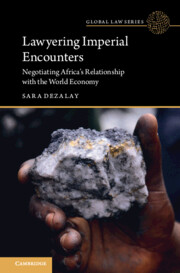Book contents
- Lawyering Imperial Encounters
- Global Law Series
- Lawyering Imperial Encounters
- Copyright page
- Contents
- Acknowledgements
- Abbreviations
- Introduction
- 1 Imperial Encounters
- 2 Indirect Rule and Middle Power
- 3 Gatekeeper States and Offshore Capitalism
- 4 The New Scramble, Deregulation, Re-regulation
- 5 Bujumbura
- 6 Abidjan
- 7 Paris
- 8 The Value of Social Class in Global Justice
- Conclusion
- References
- Index
4 - The New Scramble, Deregulation, Re-regulation
1980s–?
Published online by Cambridge University Press: 19 December 2024
- Lawyering Imperial Encounters
- Global Law Series
- Lawyering Imperial Encounters
- Copyright page
- Contents
- Acknowledgements
- Abbreviations
- Introduction
- 1 Imperial Encounters
- 2 Indirect Rule and Middle Power
- 3 Gatekeeper States and Offshore Capitalism
- 4 The New Scramble, Deregulation, Re-regulation
- 5 Bujumbura
- 6 Abidjan
- 7 Paris
- 8 The Value of Social Class in Global Justice
- Conclusion
- References
- Index
Summary
Chapter 4 examines the ongoing rush for Africa, epitomised by the global competition for the critical minerals of the ‘energy transition’. It argues that the ongoing Scramble is embedded in previous imperial imprints. The 1980s debt crisis positioned international financial institutions as the vehicles of the neoliberal turn on the continent. But this did not displace gatekeeping politics. Rather, the concurrent onshoring of offshore capitalism fostered the power of global traders like Glencore as the prime interface between resource-rich African states and global markets and as the core engineers of the transformation of the geography of extraction, based on technological and infrastructural innovations and financial deregulation. The onshoring of swashbuckler capitalism is deeply connected to a codification of capital (Pistor 2019) based on Common Law and the law of New York which is enabled by the globalisation of the Wall Street model of the corporate law firm.
Keywords
- Type
- Chapter
- Information
- Lawyering Imperial EncountersNegotiating Africa's Relationship with the World Economy, pp. 98 - 124Publisher: Cambridge University PressPrint publication year: 2025

